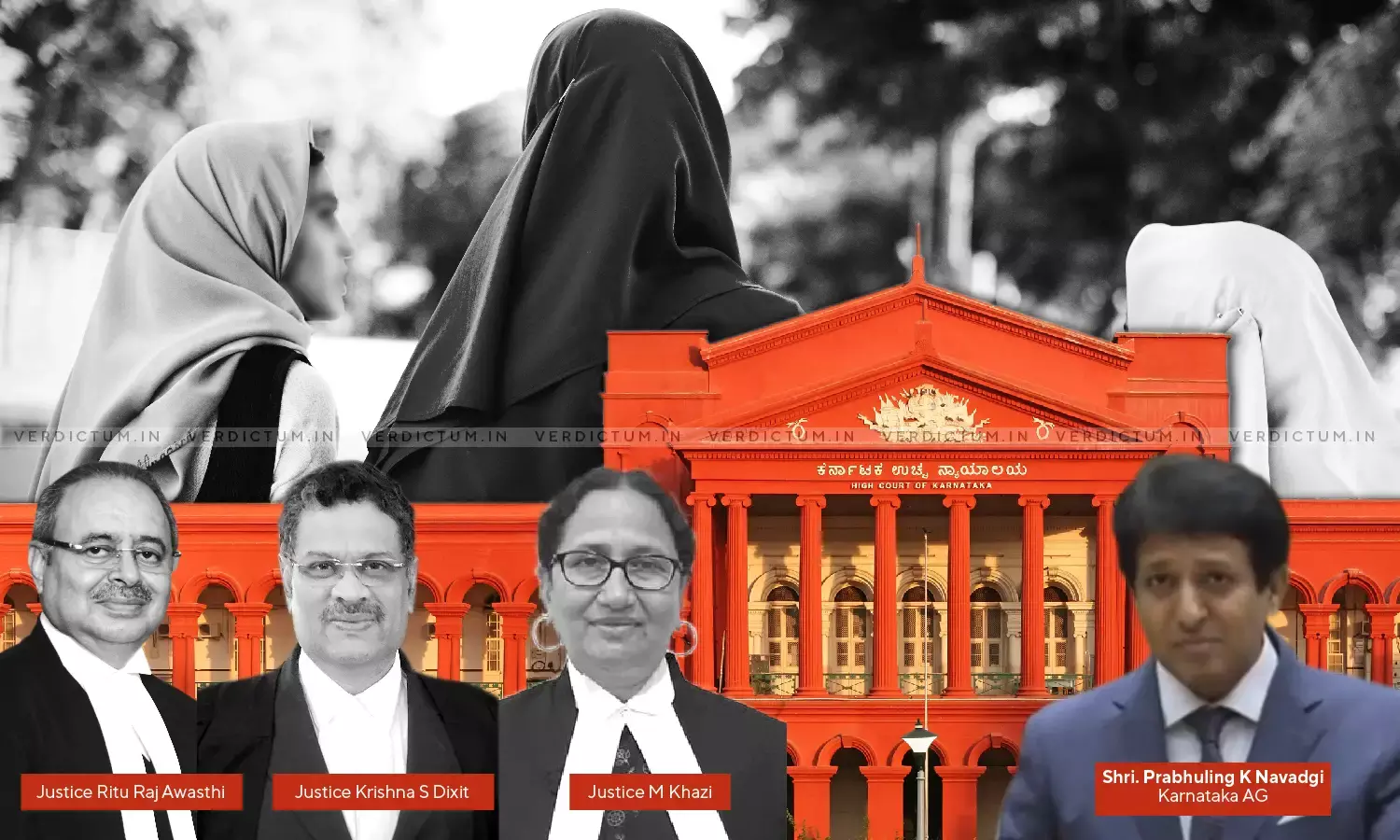"Na Muh Chhupa Ke Jiyo, Na Sar Jhuka Ke Jiyo"- Highlights From Advocate General's Arguments Today In Hijab Case

The Advocate General (AG) of Karnataka, Senior Advocate Prabhuling Navadgi concluded his arguments on behalf of the state, opposing the petitions filed challenging the restrictions imposed on wearing of hijab inside classrooms in government schools.
Here are the major points made by the Advocate General today:-
Petitioners did not demonstrate essentiality of practice
The Advocate General started his argument by contending that it was for the Petitioners to demonstrate as to what is compulsorily required to be followed as per their religion and that the Petitioners failed in doing so.
The AG pointed out that the Court had asked the Petitioner as to what is essential and what is optional from what is stated in the Holy Quran (read report). It was for the petitioner to have satisfied the Court on that aspect, the AG said.
AG cited the judgment of the Supreme Court in the matter of State Of Gujarat vs Mirzapur Moti Kureshi Kassab to contend that the Petitioners had not placed any material before the Court to establish essentiality of the practice.
Arguments based on Article 19(1)(a) and Article 25 are mutually destructive
The Advocate General submitted that the argument of the Petitioners that the right to wear hijab is protected under Article 19(1)(a) is mutually destructive to their argument that it is also an essential religious practice under Article 25. (Read our column making the same argument)
The AG argued that the argument that the practice is protected under Article 19(1)(a) would mean that there is an element of choice, which runs contrary to the argument that the practice is an essential practice under Article 25 and not an optional one.
"25 has an element of compulsion.... once you have an option, it is a 19(1)(a) right and not a 25 right", the AG argued.
The AG also pointed out that Article 19(1)(a) is subject to exception under Article 19(2) and that the Uniform Rules prescribe a reasonable restriction under Article 19(2), which has not been challenged on the ground of violation of Article 19(2).
Holy Quran does not mandate wearing of Hijab
The Advocate General contended that the Holy Quran does not mandate the wearing of Hijab. He contended that the translations of the Holy Quran relied upon by the Petitioner, i.e. Quran.com is not a reliable translation. (Read our column about Quran.com)
The AG contended that Abdula Yousuf Ali's translation has been accepted by the Supreme Court in the matter of Shayara Bano v. Union of India & Ors. or the Triple Talaq Case.
The AG also said that the translation by Marmaduke Pickthall, which was relied upon by the Supreme Court in Shah Bano's case of 1958 can also be treated as a reliable translation.
Constitutional Morality and Individual Morality
The AG argued that "in the light of the law laid down by the Supreme Court in the Sabarimala case in a different context, would it be possible today to accept the principle of hijab, on the point of constitutional morality and individual dignity?"
"Ultimately the claim of the petitioner is to wear a particular attire. If somebody is to come before your lordships and say I want to wear it, that is 19(1)(a), but if somebody is coming before your lordships for a declaration that we want every woman of a particular faith to wear that, would it not violate the dignity of that person whom we are all sitting down and subjugating... it is a compulsion of an attire which we want to impose on a particular person, which according to me is impermissible in this day and age...", the AG argued.
When the Bench asked whether a declaration by the Court regarding the essentiality of wearing of Magalsutra will mean that the Court is compelling every Hindu should wear Mangalsutra, the AG is replied that "today by way of a religious sanction a judicial declaration is sought, that we impose..it is not a question of choice, the element of choice goes away. As soon as it is a religious sanction the woman concerned, somebody may defy, that is different, the woman concerned becomes obligated by way of a religious sanction to wear that particular dress".
The Court then summarised the argument to say that according to the state, if the Court holds the practice to be essential, then it will amount to lowering the dignity of Muslim women who do not wear hijab. The AG agreed.
"Women cannot be subjected to compulsion of dress", the AG submitted.
The AG relied upon the dissenting opinion of Justice D. Y. Chandrachud in the Sabarimala case on this point. The AG told the Court that the majority judgment does not comment upon the said aspect and that the reference of the Sabarimala case to a larger bench does not affect the precedential value of the Sabarimala Judgment.
"Central force of any interpretation is human dignity, human dignity involves liberty, liberty involves choice, the choice either to wear or not to wear. The entire claim of the Petitioners is to make it a compulsion, it goes against the very ethos of the fundamentals of constitutional interpretation", the AG submitted.
The Advocate General clarified that the government order does not cover private unaided minority educational educations.
The Advocate General concluded his arguments by quoting from a Bollywood song, "Na Muh Chhupa Ke Jiyo, Na Sar Jhuka Ke Jiyo, Agar Gham Ke Daur Aaye To, Muskura Ke Jiyo". The AG said, "Nobody can put it better than that. We have all learned to lift our head high and live, that's what every woman should be trained to do and we expect them to do so".
Earlier, the Advocate General had read the verse from the Holy Quran relied upon by the Petitioner, which also says that women should lower their gaze before men.
The arguments by other Respondents in the cases will continue tomorrow.

